Three crowns for Grigory Potemkin
Large-scale state of mind, pragmatism, diplomacy, seething energy have earned him fame even during his lifetime not only in Russia, but also abroad. With the growing influence of the Russian state on the affairs of Europe, the intensification of international relations, Grigory Potemkin was considered a promising candidate for a number of state thrones.
At least three times there was an opportunity to transform the status of an unofficial prince - consort of the Russian empire into the title of monarch of one of the European principalities.
At the beginning of 1779, a group of nobles from Courland asked Potemkin to lead this small state. By that time, the Duchy of Courland formally was in vassal dependence on Poland, but in fact was subordinate to St. Petersburg. Local elites were looking for a replacement for the extremely unpopular Duke Pierre Biron. The corresponding proposal was handed over to Grigory Alexandrovich at that time by Colonel Ivan Mikhelson, who was of Baltic origin. Svetlana liked this idea, but Catherine II answered with a categorical refusal.
By that time, the development of Novorossiya was in full swing, and distracting the attention of the state governor in this strategically important region of the empire to the affairs of the Baltic duchy was seen as undesirable. In addition, the empress did not want to bind herself to any agreements with Prussia (which also had its own interests and influence in Courland) under the conditions of the alliance of Russia and Austria that was being formed.
The question of the Courland crown for Potemkin was continued in 1780. Frederick II of Prussia, concerned about the rapprochement between Russia and Austria, through his envoy in St. Petersburg, offered support for Grigori Alexandrovich’s claims on the ducal crown or in his reconciliation with the Grand Duke Pavel Petrovich. Frederick probably thought that in this way one could counterpose the personal interests of an influential courtier to the aspirations of the Russian state. But he was wrong.
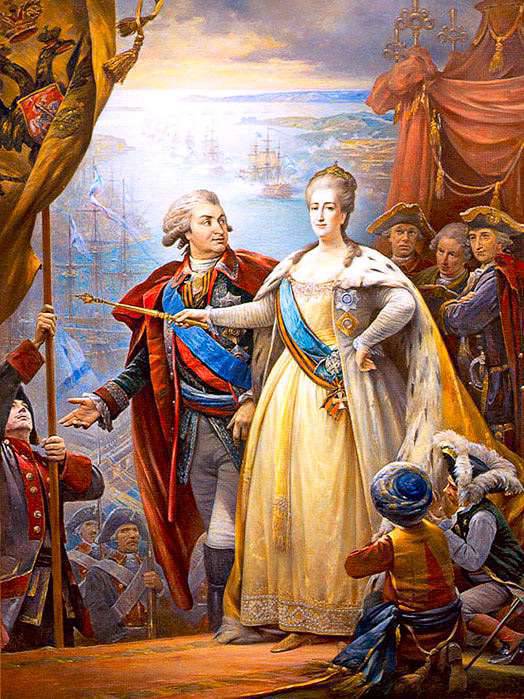
The proposal to create a semi-independent principality for Potemkin in the Polish-Lithuanian Commonwealth was expressed by the Polish king Stanislav August. It sounded during the famous journey of Catherine the Great to Crimea. 20 March 1787, at a preliminary meeting with the Russian delegation in the town of Khvostove, the head of Poland expressed the idea to turn Potemkin’s possessions in the Smela region (Right-Bank Ukraine) into a special sovereign principality. This state formation should have been formally dependent on the Polish crown, like Courland.
The fact that this step corresponded to the aspirations of the Most High Prince, may be evidenced by the fact that at the end of the 70 of the XVIII century, he himself was looking for an opportunity to create a separate possession in the territory of the Commonwealth. The so-called Russian party, which in fact was supported by Potemkin’s money, attempted to betray its extensive estates in Lithuania and Belarus to extensive estates.
Empress Catherine II was annoyed by the king’s deed. After all, it turned out that, turning to the actual co-ruler of Russia, Stanislav Augustus acted through her head. At that time, she was extremely reserved with regard to the attempts of the Russian-Polish rapprochement. Grigory Alexandrovich had no choice but to reject this initiative. A year later, His Serene Highness Prince actively promoted the plan for Russia’s absorption of the entire Polish Ukraine, as well as Belarus and Lithuania.
Grigory Alexandrovich's claims to the throne of the ruler of the Moldavian principality in currently known historical sources are not documented. On the contrary, the Austrian diplomat Charles-Joseph de Lin in his memoirs quoted the High Prince in relation to the Moldo-Wallachian throne: “This is nothing for me, if I wanted, I could become the King of Poland; I refused the Duchy of Courland. I stand much higher. ”
However, thanks to the events of the Russian-Turkish war in 1790 – 1791, Grigory Potemkin still became the de facto head of the Moldovan state. His actions in the principality went far beyond the powers of the head of the occupying administration and betrayed long-term interests in Moldova.
The commander-in-chief of the Russian armies in the south rotated the members of the Divan (the Moldavian government) and appointed the former Russian vice-consul in Iasi, Ivan Selunsky, as its head. At the main apartment in Moldova, he created a courtyard, which was a semblance of the imperial court in St. Petersburg. Here, “Asian luxury and European sophistication combined on holidays that followed one after another, with an unbroken chain ... The best contemporary artists flocked to entertain the Most Serene Prince, with important famous grandees of the neighboring countries crowding around.”
Potemkin attracted to the court the local nobility, was especially affectionate to the Moldavian boyars. Those, in turn, almost openly called on Grigory Alexandrovich to take the fate of the principality into their own hands. In the letters, they thanked him for his release from the "tyranny of the Turks" and begged not to lose sight of the interests of their country, which would always "honor him as a liberator."
Many Moldovans served in the General Staff and in the army. Moldovan volunteers (about 10 thousand) were transferred to the position of the Cossacks and subordinated directly to Potemkin. Instead of collecting taxes by the Ottomans, Moldova introduced supplies to provide Russian troops with supplies and transport. The Russian administration demanded from local authorities strict compliance with the layout of duties in accordance with the income of residents. Due to the fact that in the regions of Moldova occupied by Austrian troops, a more stringent tax regime was established, there was an influx of population into the territory subject to Potemkin.
In February 1790, at the behest of Grigory Alexandrovich, the first newspaper-type print publication in the history of Moldova was published. The newspaper was called Courier de Moldavia, published in French, each of its numbers was decorated with the coat of arms of the Principality of Moldova - an image of the head of a bull crowned with a crown.
Potyomkin patron of Moldovan cultural and art workers. It was he who managed to see the great talent of the artist in Eustaphy Altini, who later became an outstanding icon painter and portrait painter. The care of the prince of a peasant nugget from Bessarabia was sent to study at the Vienna Academy of Arts. Local art critics say that the artistic impressions of the inhabitants of the principality under the influence of the musical and theatrical undertakings of the prince turned out to be so significant that they allow us to talk about the “Potemkin era” in Moldova.
Probably the most ambitious undertaking of the Most High Prince in the Danube Principality was the establishment of the Moldavian Exarchate in 1789 year. Despite the fact that the Danube principalities were the canonical territory of the Constantinople Patriarchate, the exarchate was created as part of the Russian Orthodox Church. It can be assumed that Grigory Aleksandrovich would hardly have unleashed a conflict with the Patriarch of Constantinople if he had not linked his future with Moldova.
Potemkin’s plans for the Moldavian principality can shed light on the content of diplomatic battles during the Russian-Turkish war of 1789 – 1791.
The plan for the war, approved by the State Council of Russia in 1787, was based on the provisions of the Russian-Austrian agreement 1781 of the year. The treaty provided for the rejection of the Moldavian and Valashsky principalities from the Ottoman Empire, their unification into one independent state called Dacia. The ruler of this new state was supposed to make a prince professing Orthodoxy, attentive to the interests and security of Russia and Austria.
At the end of 1788 of the year (after the capture of Ochakov) under the influence of the folding of the Triple League (England, Prussia and Holland) and its threats against Russia, St. Petersburg was ready to make concessions to Istanbul on the issue of the Danube principalities, while maintaining their autonomous status.
The active offensive actions of the Allies in 1789 led to the creation by Russia and Austria of a draft peace treaty with Turkey, which offered Porte to begin negotiations based on the principle of uti possidetis (recognition of the right to possession of the conquered territory). The recognition of the independence of Moldova and Wallachia, according to this draft, was one of the most important conditions for concluding a peace treaty. By that time, Russia actually controlled most of Moldova, Austria occupied Wallachia.
Based in Iasi, Grigory Potemkin insisted on the need to create a separate Moldavian principality. This is evidenced by the rescript of Catherine II to Potemkin, dated March 1790 of the year: “You know that in case of success weapons of ours, we assumed an independent region, from Moldavia, Wallachia and Bessarabia compiled, under its ancient name Dacia ... We agreed with your opinion that even Moldova alone in its abundance could ... make up a profitable lot ... ” Turkish vizier, plentifully stimulating the pliability of Ottoman officials with generous offerings.
However, England and Prussia again intervened, insistently demanding the return of the Danube principalities of the Ottoman Empire. In February, 1790 of the year, Emperor Joseph II died, and already in July, the Austrians signed a truce with the Turks, giving them the territory of Wallachia and leaving Russia alone with the Ottomans and the pro-Turkish coalition in Europe. Catherine II again doubted the need to defend an independent status for Moldova. Nevertheless, in the 1790 year, under the command of Potemkin, the Russian armies and the Black Sea Fleet conducted one of the most brilliant campaigns in their history, the crown of which was the capture of Ishmael. Encouraged by Western support, the Turks delayed peace negotiations. It was not possible to end the war in 1790.
Concerned with the growing aggravation of relations with England and Prussia, the military preparations of Poland, Catherine more insistently advocated the signing of a peace treaty with Turkey. In February, 1791, the Most Serene Prince, went to Petersburg, transferring command of the armies to Prince Nikolai Repnin. In the capital, he insists on the need for a deal with Prussia (at the expense of Poland) to obtain freedom of action against the Turks and Poles. Meanwhile, Repnin becomes the main negotiator with Turkey, having received from the Empress the authority to interrupt military operations at any time on favorable terms for Russia.
While the continuation of the war saw Catherine II becoming increasingly unpromising, the anti-Russian coalition in Europe began to make deep cracks. In England, antiwar sentiment was rapidly growing (merchants, port workers and even sailors protested), March 18, English opposition leader Charles James Fox, said a fervent speech in parliament, proving that England had nothing to defend under Ochakov, British Prime Minister William Pitt was accused of patronizing the Turks - "Asian barbarians." Anglo-Prussian relations have sharpened.
31 July 1791 of the year, taking advantage of the victory in the Machinsky battle, the day before Potemkin’s return to the headquarters of Commander-in-Chief Repnin signed an armistice agreement and preliminary conditions for a peace treaty with Turkey. The document provided for the expansion of the territory of Russia at the expense of the Bug-Dniester interfluve during the return of Moldavia and Wallachia to the sultan on autonomy. The High Prince was indignant at the last demand. In a correspondence with Catherine, he spoke of the need to reduce the truce. Quite rightly, he reprimanded Repnin that he was too in a hurry to make peace at the moment when Ivan Gudovich's troops took Anapa, and Fyodor Ushakov’s fleet crushed the Turks under Kaliakria. According to Grigory Alexandrovich, these events would have made the conditions of peace incomparably more beneficial for Russia.
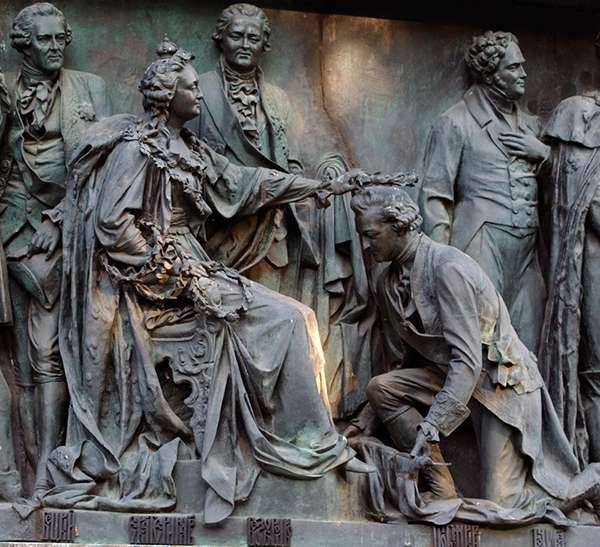
Potemkin joined in the struggle for the revision of the conditions of unprofitable agreement. He demanded that Turkey pledged "not to change" the rulers of Wallachia and Moldova of their own accord, giving the right to appoint them to the Boyar divan with the approval of the Russian consul. Turkish diplomats fiercely resisted, seeing in this a desire only to formally subordinate Moldavia to the Ottoman Empire. New military preparations began. It is difficult to imagine how this confrontation would end, if not the sudden death of the Most High Prince.
Grigory Alexandrovich died on October 5 1791 on the way from Yass to Nikolaev, ten versts from the Moldovan village of Puncheshty (now Old Rededeny, Ungheni Region of Moldova). On October 11, crowds of people flocked to the mourning ceremony in Iasi, Moldovan nobles lamented the loss of their benefactor, along with Potemkin’s military comrades.
Grigory Potemkin’s claims to the thrones of a number of monarchical state formations are closely interwoven into the history of Catherine the Great’s foreign policy of Russia. His actions can be justified by the stylistics of international relations of the 18th century, by the great vanity of the Most High Prince, by his objective desire to protect herself in the event of the death of the Empress-Co-Bridesmaid.
Nevertheless, the monarchical ambitions of Grigory Alexandrovich themselves were not opposed to the interests of the Russian state. On the contrary, the implementation of personal geopolitical projects of Potemkin characterizes him as a statesman, putting in the first place the achievement of foreign policy successes of the Russian Empire.
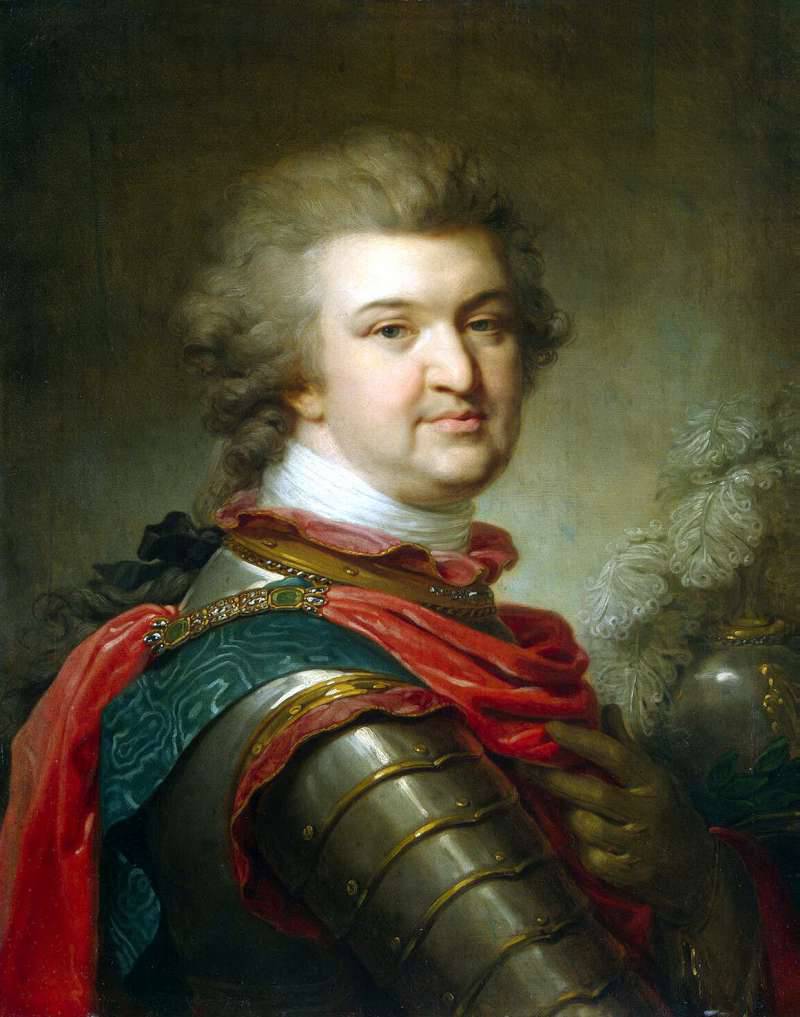
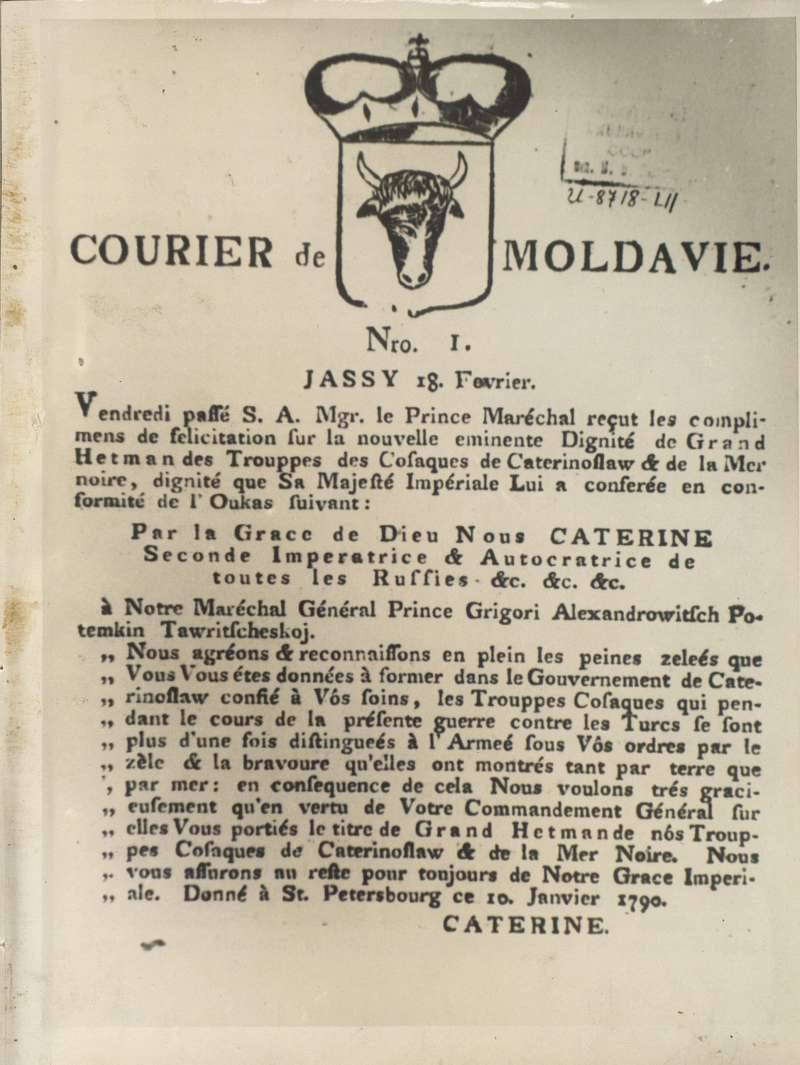
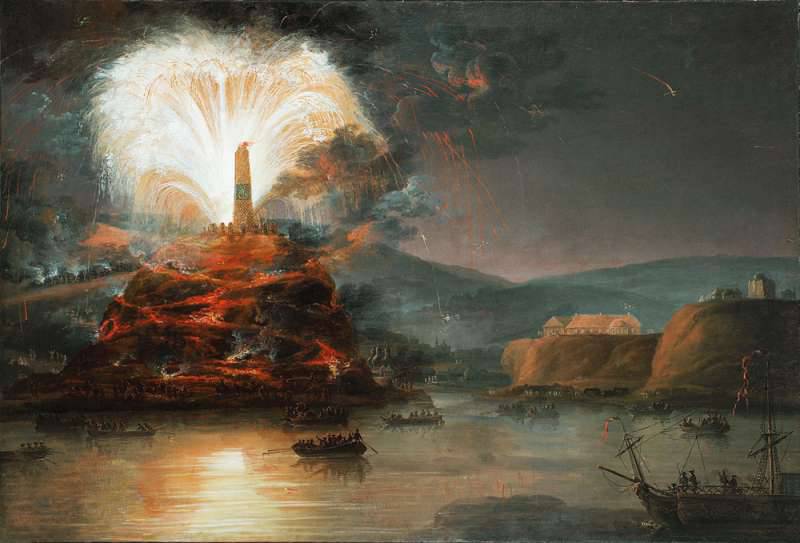
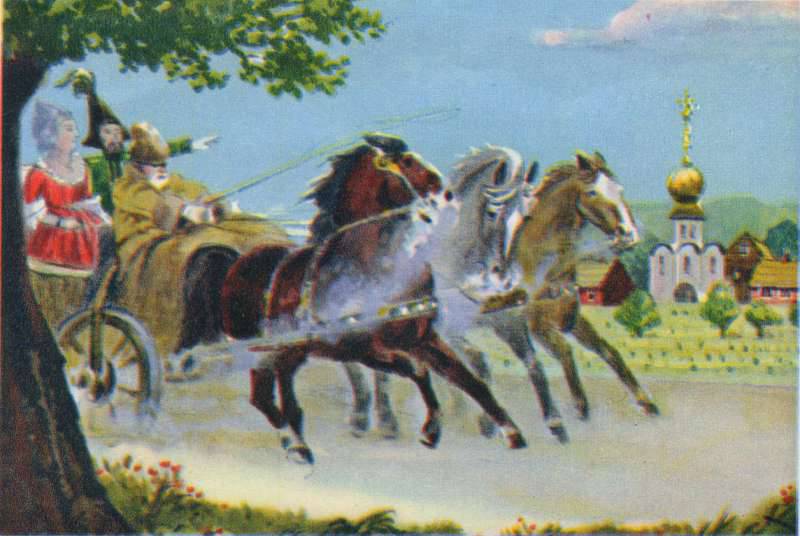
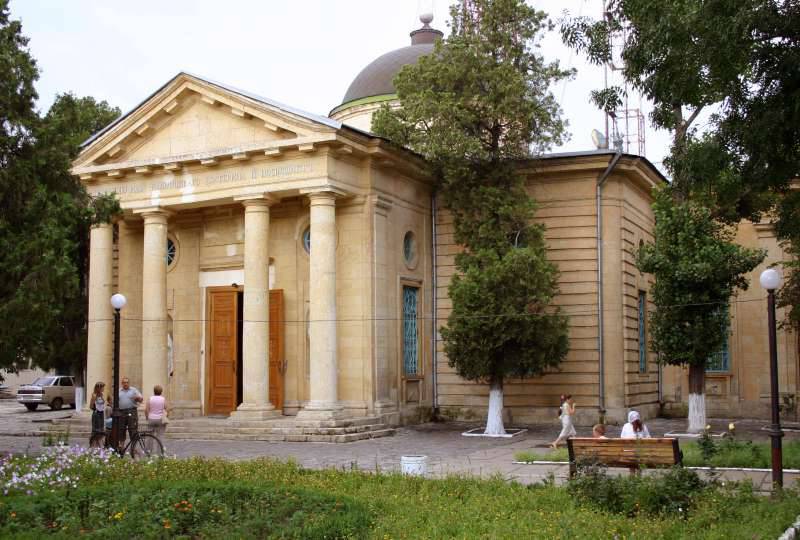
Information